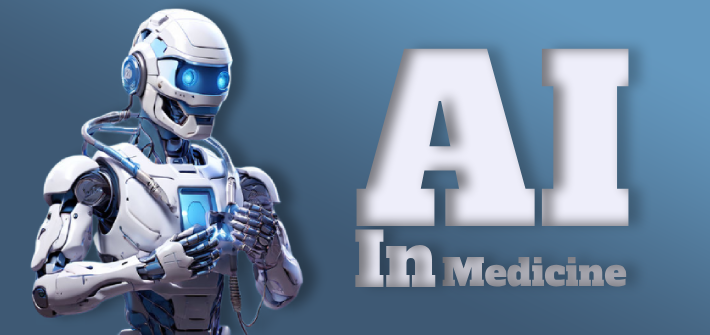The integration of artificial intelligence (AI) into the medical and healthcare sectors has been a transformative development. AI’s capabilities extend beyond basic automation, offering significant advancements in diagnostics, treatment planning, and patient care. This article delves into the benefits of AI in medicine and healthcare, its future prospects, and the regulatory hurdles it faces.
Benefits of AI in Medicine and Healthcare
Enhanced Diagnostics
One of the most notable benefits of AI in medicine is its ability to enhance diagnostic accuracy. AI algorithms can analyze vast amounts of medical data, including imaging scans, lab results, and patient records, to identify patterns and anomalies that may be missed by human eyes. This leads to earlier and more accurate diagnoses, which are crucial for conditions like cancer, cardiovascular diseases, and neurological disorders.
Personalized Treatment Plans
AI enables the creation of personalized treatment plans tailored to individual patients. By analyzing a patient’s genetic information, lifestyle, and medical history, AI can recommend specific treatments that are most likely to be effective. This personalized approach increases the chances of successful outcomes and reduces the risk of adverse reactions.
Predictive Analytics
AI’s predictive analytics capabilities allow healthcare providers to anticipate patient needs and outcomes. For instance, AI can predict which patients are at high risk of developing certain conditions, enabling preventive measures to be taken. This proactive approach improves patient care and reduces healthcare costs by avoiding expensive treatments for advanced diseases.
Streamlined Administrative Tasks
AI can automate many administrative tasks, such as scheduling appointments, managing patient records, and processing insurance claims. This reduces the workload on healthcare staff, allowing them to focus more on patient care. Moreover, automation minimizes errors and increases efficiency in healthcare operations.
Improved Patient Monitoring
Wearable devices and AI-powered monitoring systems can continuously track patients’ vital signs and health metrics. These systems can detect early signs of deterioration and alert healthcare providers, ensuring timely interventions. This is particularly beneficial for managing chronic diseases and post-surgery recovery.

Future of AI in Medicine
Generative AI in Medicine
Generative AI, a subset of AI that involves creating new content, holds immense potential in medicine. It can be used to generate new drug compounds, design personalized treatment protocols, and even simulate complex surgeries. Generative AI models can also help in creating realistic training scenarios for medical professionals, enhancing their skills and preparedness.
AI-Powered Robotic Surgery
The future of AI in medicine includes the integration of AI with robotic surgery. AI algorithms can assist surgeons by providing real-time guidance, predicting potential complications, and ensuring precise movements. This can lead to minimally invasive surgeries with faster recovery times and fewer complications.
Virtual Health Assistants
AI-powered virtual health assistants can provide patients with 24/7 access to medical advice and support. These assistants can answer common health queries, provide medication reminders, and even offer mental health support. This increases accessibility to healthcare, especially in remote or underserved areas.
AI in Medical Research
It is set to revolutionize medical research by accelerating the discovery of new treatments and therapies. AI can analyze vast datasets from clinical trials, genomic studies, and medical literature to identify potential breakthroughs. This can significantly shorten the time required for drug development and approval.

Regulatory Approval of AI in Medicine and Healthcare
Challenges in Regulatory Approval
The regulatory approval of AI in medicine is a complex process that involves several challenges. One major challenge is ensuring the safety and efficacy of AI systems. Regulatory bodies like the FDA in the United States require extensive testing and validation to prove that AI tools are reliable and do not pose risks to patients.
Ensuring Transparency and Accountability
Transparency and accountability are critical for gaining regulatory approval. For instance, AI systems must be transparent in their decision-making processes. Additionally, developers must be accountable for their tools’ performance. This requirement includes providing detailed documentation, undergoing rigorous testing, and implementing measures to address any biases in the ai algorithms.
Data Privacy and Security
AI systems in medicine handle vast amounts of sensitive patient data. Therefore, ensuring data privacy and security is paramount to gaining regulatory approval. To achieve this, AI developers must comply with data protection regulations, such as GDPR in Europe and HIPAA in the United States. Consequently, this involves implementing robust encryption, secure data storage, and strict access controls.
Collaborative Approach
A collaborative approach between AI developers, healthcare providers, and regulatory bodies is essential for the successful integration of AI in medicine. Specifically, this involves ongoing communication, sharing of best practices, and continuous monitoring of AI systems post-approval. Consequently, such collaboration ensures that AI tools are used safely and effectively in clinical settings.
Case Studies of Regulatory-Approved AI Tools
Several AI tools have already received regulatory approval, demonstrating the potential of AI in medicine. For example, IDx-DR, an AI-based diagnostic system for diabetic retinopathy, received FDA approval in 2018. Another example is Viz.ai, which uses AI to detect strokes in CT scans and has been approved for use in emergency settings. These case studies highlight the feasibility and benefits of AI in healthcare when regulatory standards are met.
Conclusion
AI in medicine and healthcare offers numerous benefits, including enhanced diagnostics, personalized treatments, predictive analytics, and streamlined administrative tasks. Furthermore, the future of AI in medicine looks promising due to advancements in generative AI, robotic surgery, virtual health assistants, and medical research. However, achieving regulatory approval for AI tools is a complex process that requires addressing challenges related to safety, transparency, data privacy, and collaboration.
By navigating these challenges and adhering to regulatory standards, AI has the potential to revolutionize medicine and healthcare. Consequently, it can improve patient outcomes and transform the industry. Moreover, as AI technology continues to evolve, its role in medicine will only grow. This evolution is paving the way for a new era of healthcare innovation.



